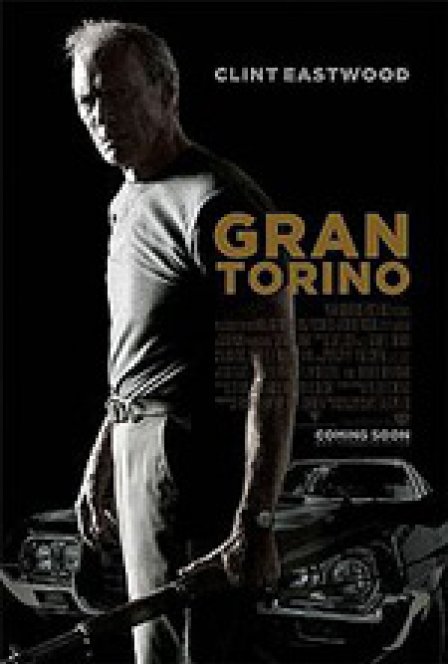About midway through Gran Torino, elderly Korean War veteran Walt Kowalski’s son- and daughter-in-law pay him an unexpected visit for his birthday. Played by Clint Eastwood at his most crotchety, Walt sits rigidly at his kitchen table, reaches into a festive gift bag, and draws out a telephone. His daughter-in-law, through a plastered on, overly eager grin that belies her apathy towards Walt, condescendingly states the obvious: “See? It’s a phone!” The only thing that keeps this scene from being an incredibly apt metaphor for the entirety of Gran Torino is the sense I get that director and star Eastwood actually meant well with this project. The film practically shouts at the viewer, stating and overstating its ideology in the least subtle of ways as it rumbles towards its conclusion.
Walt is a past-his-prime tough guy who has been shaken to the core by killings committed years ago. Recently widowed and fearful of the changing world around him, Walt spends his time alone at home with his dog, his firearms, and his prized 1972 Gran Torino. A strident and vulgar racist, he is forced to associate with his new Hmong neighbors after their son Thao (Bee Vang) reluctantly attempts to steal the Gran Torino as a gang initiation rite. As Thao tries to atone for his crime by doing yard work for Walt, Walt begins to feel sympathy for Thao and his older sister, Sue (Ahney Her), and endeavors to protect them from the dangerous Hmong gang.
Gran Torino is hampered from the outset by one of the least delicate scripts in recent memory. The first major screenplay from writer Nick Schenk has an irritating propensity to announce everything it wants to say instead of letting the audience connect the ideological dots. At one point, Walt actually looks into a mirror and says aloud, “You know, Walt, you have more in common with these Hmong people than your own children!” Later, as Thao performs various chores for Walt, the old man looks on with an expression that changes clumsily from contempt to grudging acceptance in a tired and didactic montage with neither nuance nor emotional impact.
Despite his icon status and the rumors that this is his cinematic swan song, Eastwood unfortunately shares the blame with Schenk for the film’s maddening simplicity. His direction is uncharacteristically clumsy, often falling back on crutch shots that a director of his stature should know to avoid. Visual clichés abound, including the woefully trite “sad pet reaction shot” and a quick pan from Eastwood’s face to his hand in time to see him drop a glass in shock after Sue is beaten and raped by the Hmong gang. His direction also tends to produce one-note caricatures from the film’s peripheral characters. Walt’s granddaughter’s selfish immaturity and the Hmong gangbangers’ macho posturing are so over the top that they cede any claim to believability.
Furthermore, the heavy-handedness of the whole affair rubs off on Eastwood’s own performance. For a legend who has proven himself time and again an actor capable of tremendous subtlety, Eastwood here has a disappointingly narrow dramatic range that falls between “gruff and hateful misanthrope” and “gruff but lovable misanthrope.” When he isn’t running through every antiquated racial epithet in the English language, he spends most of his time squinting and loudly grunting at numerous slights to his cultural sensibilities.
Astonishingly, the film manages to be culturally insensitive for reasons wholly separate from its hero’s xenophobia. The Hmong in the film are relegated to little more than a backdrop for Walt’s personal tale. They could be any race, it seems, as long as they are “other” to Walt. Easy visual cultural signifiers such as food and shamanic traditions are employed to show Walt’s gradual transition from scared contempt to respect without providing any real insight into Hmong culture or fleshing out any of the Hmong characters. Worse, the plot actually hinges on an extremely dubious generalization about Hmong people that necessitates Walt’s final heroic act in protection of Thao and Sue. I won’t spoil the conclusion here, but suffice to say things could have played out very differently if the film did not assume that Hmong people all think and act in the same counterintuitive way.
For all of its bludgeoning obviousness, Gran Torino does feature fleeting moments of subtlety that point towards what Eastwood seemed to intend this film to be, even as insurmountable forces draw it in the opposite direction. Most strikingly, Walt’s final speech brushes against a very famous quote from iconic “Dirty” Harry Callahan and turns it on its head as Walt’s tale ends in precisely the opposite manner that Callahan’s would have. In this sense, Gran Torino does approach the deconstructive ground Eastwood covered so elegantly in Unforgiven, revising his urban vigilante image much as that previous film imbued his western gunslinger with very human guilt. Yet even here subtlety is brutally sacrificed in favor of the film’s most shockingly clichéd visual metaphor. Gran Torino is a film that could have, should have been better, a film admirable in intent, but critically flawed in execution.

